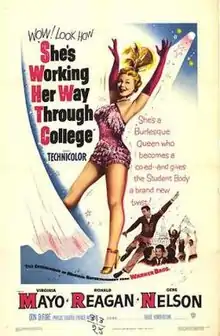She's Working Her Way Through College
She's Working Her Way Through College is a 1952 American comedy film produced by Warner Bros. A musical comedy in Technicolor, it was directed by H. Bruce Humberstone, and starred Virginia Mayo and Ronald Reagan. The on-screen credit reads “Adapted from a stage play by James Thurber and Elliott Nugent“. The unnamed play is the authors' First Amendment comedy/drama, The Male Animal, which was adapted into a film by the same name in 1942.[1]
| She's Working Her Way Through College | |
|---|---|
 Theatrical release poster | |
| Directed by | H. Bruce Humberstone |
| Produced by | William Jacobs |
| Screenplay by | Peter Milne |
| Based on | The Male Animal (1940 play) by Elliott Nugent James Thurber |
| Starring | Virginia Mayo Ronald Reagan Gene Nelson |
| Music by | Ray Heindorf |
| Cinematography | Wilfred M. Cline |
| Edited by | Clarence Kolster |
Production company | |
| Distributed by | Warner Bros. |
Release date | July 12, 1952 |
Running time | 104 minutes |
| Country | United States |
| Language | English |
Plot
In the early 1950s, Angela Gardner is a burlesque star known as Hot Garters Gertie. She started working as an exotic dancer solely to earn money for a college education. She wants to be a writer, and has been working on a play for many years. She decides to enroll in Midwest State, where her former high school teacher, John Palmer, is now Professor of English. Palmer, aware of Angela's occupation after seeing her perform, encourages her enrollment. Angela mistakenly thinks Palmer wants to meet her privately after she receives a fur coat, but she discovers the coat was sent by one of her admirers who tries unsuccessfully to seduce her. At the college, there is a long-standing rivalry, going back to their own college days, between Palmer and onetime college football jock Shep Slade, who is still fond of Palmer's wife, Helen. With the help of fellow student Don Weston, and despite interference from the jealous "Poison Ivy" Williams, Angela succeeds in her studies. Palmer suggests that she turn her play into a musical. When the Theatrical Arts class votes to do a musical instead of the usual work by Shakespeare, Angela's play is a natural. After "Poison Ivy" discovers Angela's past and exposes it in the college newspaper, Board of Trustees Chairman Fred Copeland demands her expulsion. Palmer is defiant and defends Angela at an open school assembly. Angela goes to ask Copeland not to expel her and discovers he is the man who tried to seduce her. Embarrassed, he accepts her return of the mink coat which Copeland's wife unknowingly wears at the performance of Angela's play.
Cast
- Virginia Mayo as Angela Gardner / 'Hot Garters Gertie' (singing voice was dubbed by Bonnie Lou Williams)
- Ronald Reagan as Professor John Palmer
- Gene Nelson as Don Weston (singing voice was partially dubbed by Hal Derwin)
- Don DeFore as Shep Slade
- Phyllis Thaxter as Helen Palmer
- Patrice Wymore as 'Poison' Ivy Williams
- Roland Winters as Fred Copeland
- Raymond Greenleaf as Dean Rogers
- Ginger Crowley as Lonnie - Ivy's Friend
- Norman Bartold as 'Tiny' Gordon
- Ramon Blackburn as Singer / Dancer
- Royce Blackburn as Singer / Danc er
Reception
Bosley Crowther of The New York Times declared that the best thing in the film was Gene Nelson's gymnastics-dance number. He warned his readers that if they looked closely they would realize that the unnamed play in the opening credits “is none other than those authors' vastly humorous and neatly trenchant The Male Animal... (The) Warner boys have so rearranged and watered down the plot of the original that the resemblance is blissfully remote...And where Mr. Thurber and Mr. Nugent made the fate of their hero turn upon his daring to read a letter by Bartholomew Vanzetti to his English class, Mr. Milne has worked up a crisis over the rights of the little lady to stay in school... But, plainly, the stubborn endeavor to weave a musical story line into the stout fabric of The Male Animal—and such a silly musical story line, at that—has resulted in a combination that does credit to neither one. The musical story is routine...the play has been woefully stripped of humor, pertinence and sting. Bruce Humberstone, who directed, must have felt himself working on mud”.[1]
In his afterword to TCM's June 2020 airing of the film, Dave Karger[2] observed that in 1952, a production using the plot of the original play and the 1942 film adaptation would have been impossible, because Hollywood was in the grips of the Communist witch hunts of the McCarthy era.
References
- Crowther, Bosley (1952-07-10). "THE SCREEN IN REVIEW; ' She's Working Her Way Through College,' With Virginia Mayo, New Bill at Paramount". The New York Times. ISSN 0362-4331. Retrieved 2020-06-13.
- "Dave Karger". Turner Classic Movies. Retrieved 2020-06-13.
_still_1.jpg.webp)